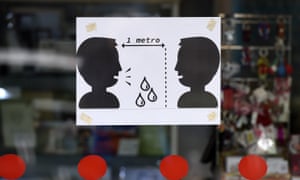In Greece this morning, the infection rate has risen from 84 to 89 overnight, according to the country’s health ministry.
One of the cases, it said, had been “imported” from London. Medical authorities, who confirmed the first case of the novel virus in Greece on 23 February, described the condition of a 65-year-old man battling pneumonia in a hospital isolation unit in the western port city of Patras as being “very serious.” He had been among a group of Greeks who contracted coronavirus after travelling to Israel and Egypt on a tour of religious sites.
Of the total, 27 were hospitalised in specialist units and 57 were in isolation at home, the health ministry said.
On Monday, it was confirmed that a 40-year-old woman on Lesbos had also been infected following a trip to Israel. Local authorities ordered the school attended by her two children in the resort town of Plomari to be closed amid fears of an outbreak on the island, which is hosting 27,000 migrants and refugees – most in appalling conditions in Moria, the reception centre outside Mytilene, the port capital. MPs have called for the local health system, already vastly overstretched, to be bolstered with more doctors, saying Mytilene’s hospital barely has room to cope with six coronavirus patients raising the spectre of meltdown if more people test positive.
The rise in numbers came as the first case of coronavirus was also confirmed in the Turkish-run breakaway republic of northern Cyprus. Turkey’s Anadolu news agency reported that a German woman, on holiday in the rump state, had contracted the virus. On Monday, authorities in the island’s internationally recognised south announced the first two cases of coronavirus, including a prominent heart surgeon believed to have been infected on a recent trip to London.
Updated
The French culture minister, Franck Riester, has tested positive for the coronavirus. He said he is self-quarantining. Riester is the first high-profile French politician to confirm he has tested positive, but five MPs from the Assemblée National and two other parliamentary members of staff are among those who have the virus.

The French health authority in its daily briefing on Monday evening said there were now 1,412 cases in France, a jump of 286 on the previous day. There have been 25 deaths: 10 women and 15 men. Of those who have died, 21 were aged over 70. There are seven clusters of virus cases including a new cluster at Ajaccio, capital of Corsica, where 38 new cases have been confirmed.
France is still at stage 2 of its disease alert, but officials admit that stage 3 is looking increasingly inevitable.
Updated
As the whole of Italy goes into lockdown, there are some reassuring signs that measures are starting to work. Across the 11 towns that went into quarantine more than two weeks ago, the number of cases is beginning to fall.

“In the province of Lodi, and even more so, in Codogno, there’s a net reduction in the number of positive cases,” said Giulio Galleria, the welfare councillor for Lombardy, the region worst affected.
The 38-year-old man from Codogno, who was Italy’s first locally transmitted case, was moved out of intensive care on Monday. The number of people to have so far overcome the virus is 724.
Updated















